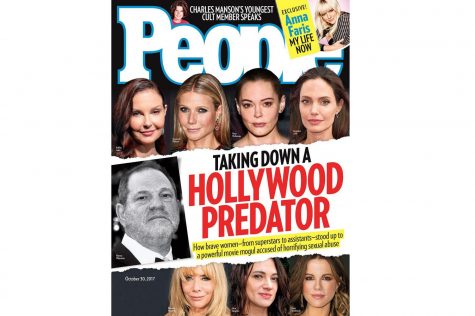A Culture of Indifference

October 30, 2017
Two weeks ago, The New York Times published an investigative report revealing that Harvey Weinstein, one of Hollywood’s most influential producers, is facing at least eight accusations of sexual assault spanning multiple decades. The article alleged that Weinstein would invite young, up-and-coming actresses into his hotel room for “business purposes” and instead greet them nude, ask them for a massage, or watch him shower. Weinstein’s sexual misconduct was seen as an “open secret” in Hollywood—something that everyone knew about but no one wanted to expose.
When film producer Emily Best, for example, received a text about the Harvey Weinstein “news,” she was not the least bit surprised. Best herself called Weinstein’s actions an “open secret.” Best also stated that “the industry at large provided shelter for his bad behavior directly and indirectly.”
“Since [Weinstein’s] climb to the top, time and time again there have been references to Harvey’s misconduct in the media,” Elizabeth Kiselev (‘18) said. “From episodes of 30 Rock that had jokes about him sexually harassing women air in its episodes to Seth MacFarlane joking about it live on the 2013 Oscars stage. This case shows not only the disgusting past of one man but also the horrible culture that has evolved in Hollywood, which normalizes sexual assault and harassment.”
Many are attributing the silence and acceptance of Weinstein’s actions in Hollywood as a result of a culture of sexual-transgression that reigns in a male-dominated industry that hasn’t changed in over 4o decades.
But I think blaming the silence that surrounded Weinstein’s actions as a problem in Hollywood is only skimming the surface of an even greater issue. This “open secret,” this silence in face of Weinstein’s sexual misconduct does not just reflect an issue within the film-industry but within our society as a whole.
According to RAINN.org, a hotline for victims of sexual-violence, two out of three cases of sexual assault go unreported. This means that nearly 67% of victims are too scared to speak out and expose their abuser. This paralyzing fear that all too many victims of sexual assault experience is a result of our society’s toxic treatment of sexual violence, known as rape culture.
Rape culture is a term used to describe a culture in which rape or other sexual crimes are pervasive and institutionalized. Common manifestations of rape culture include trivializing, denying, and glamorizing rape, slut shaming, victim blaming, and sexual objectification. Of these behaviors associated with rape culture, victim planning is one of the most oppressive and dangerous.
Our society tells victims of sexual assault, especially women, that they were “asking for it”— that if they didn’t wear that dress, go to that party, or drink that much, maybe they wouldn’t have been assaulted. Our society focuses more on giving youth techniques on “how not to get raped” than it does on teaching “how not to rape.” However, these “techniques” in preventing sexual assault do not prohibit it but promote it. Blaming victims for the heinous crimes they’ve endured has not stopped rape. Instead, victim blaming leaves victims afraid to come out about their assault and perpetrators unaware of the severity of their actions— continuing the cycle of indifference that rape culture promotes. 
The silence in face of Weinstein’s widely known sexual misconduct, therefore, is not surprising but consistent with our society’s outlook on sexual assault. Rape culture has taught victims to remain silent in face of abuse because it’s easier that way. And it’s true. It is easier to remain quiet because when victims do speak out, they are dismissed, silenced, or harassed. Whenever a new powerful man is accused of sexual harassment, the women who make allegations are depicted as attention-seeking, dramatic gold-diggers.
The only way that we can stop allowing people like Harvey Weinstein from getting away with their actions is by overcoming the silence that rape culture promotes and speaking out. That’s why I encourage anyone who can to speak out about their experiences with sexism, microaggressions,
or sexual assault. By sharing our experiences and raising awareness we can create a community unified by a common struggle yet empowered by the strength of storytelling.
















































































































































